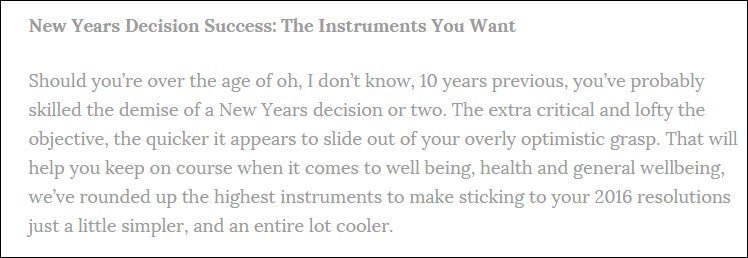Bad writing stops new affiliate marketing bloggers' sites from getting listed, so they don't get readers and then don't make sales.
Why? Well, the problem is that some new bloggers pump out poorly written content in their rush to get listed and ranked by search engines.

Here's an extreme example from a new blog that has been publishing copious material every day since inception:

Stunningly terrible writing, isn't it? 🙂
From the perspective of someone who understands English, would you ever visit this blog a second time as a ‘trusted source' of information?
I didn't think so!
Note: I did a tiny bit of research to determine that this ‘blogger' (term used loosely) stole an article from another site and then ran it through an article spinner to generate the mess pictured above.
As I said above, that was an extreme example of bad writing, but there are numerous other writing errors that can cause readers to cringe and refuse to return to our affiliate sites.
Here are some of the writing mistakes bloggers make and how you can avoid them:
-
Writing for Google
Articles that are written to attract Google links, i.e. repeating keyword phrases in the title, description and text; sound completely ridiculous. Here is the example Google uses to illustrate what is known as ‘keyword stuffing.'

You may laugh at the notion that anyone would actually write, let alone publish, an article containing a paragraph that sounds so bizarre, but the web is loaded with them.
Fortunately for readers, Google de-lists sites that attempt to manipulate search engine rankings in this manner.
Google will show its appreciation for your site when you attract new and repeat visitors through well-written and informative articles.
-
Misspelling Words and Using Improper Grammar
There is no excuse for spelling errors, especially when you are writing on a computer.
Word has a built-in spell checker and if you don't use Word, then avail yourself of software that will check both your spelling and grammar.
I've been using Grammarly for many months and it has helped improve my writing a great deal – and I really DO know how to spell. 🙂
Knowing how to spell doesn't mean my typing is always perfect, though, and goodness knows that my grammar is often far from perfect.
Below is a screen capture from a typo picked up by Grammarly while I was writing this blog post…

Check out this list of words that make bloggers seem dumb.
-
Fail at Formatting
Your spelling and grammar might be perfect, but if there is only one block of text or each sentence constitutes a paragraph, you'll lose readers by the second or third line of your post.
Make your whole article easier to read by adding subheadings, numbered bullet points, or both, as I've done with this article.
-
Being Hypey or Fake
The surest sign of a poorly written (and probably fake) product review is one that is loaded with superlatives praising the product. Some examples of these are best, amazing, quickest, richest, etc. No product is perfect and a well-written review will reflect its downfalls as well as its advantages.
Don't try to write like someone you're not. You don't want to come off as sounding pretentious. If you wouldn't normally use a certain word during a conversation with a friend, then avoid using it when you are writing for your blog.
If you are new to writing for public consumption and worry about how people will receive your work, the best advice I can offer to end up with writing that sounds natural is to write like you speak.
I sometimes use Dragon NaturallySpeaking
software when my head is bursting with things I want to say in an article. With the program open, I just rattle away until I've said everything I want to say (or can remember at the time). I smooth out the rough edges later to make the writing ‘sound right'.
-
Not Proofreading Your Work
I am guilty of failing to proofread on far too many occasions and then cringing when I re-read my own published posts!
Spelling and grammar checkers won't guarantee that your blog post adheres to the 5 C's of copy editing, i.e. that the writing is clear, correct, concise, comprehensible, and consistent.
Therefore, before you publish, read your article through to make sure it conveys the message you want to get across clearly.
Better yet, ask someone to review and provide feedback about your blog post.
Communicating well lies at the heart of what we do as affiliate marketing bloggers.
Your objective while writing a review should be to completely satisfy your readers' desire to know how the product you are promoting will fill their needs — honestly, and in a manner that is easy and enjoyable to read.
If you want to improve your writing, here are a few of the tools and books I like and can recommend:
- Grammarly – grammar and spelling checker.
- Eats, Shoots & Leaves: The Zero Tolerance Approach to Punctuation – best-selling book about punctuation.
- The Elements of Style – the classic style manual by Strunk & White.
If you found a grammatical or spelling error in this post, PLEASE let me know!! 🙂
Did you find this post about how bad writing kills sales informative and useful? If so, please share it with others! If you have a comment, question, or suggestion, please post it below!
Cheers,
